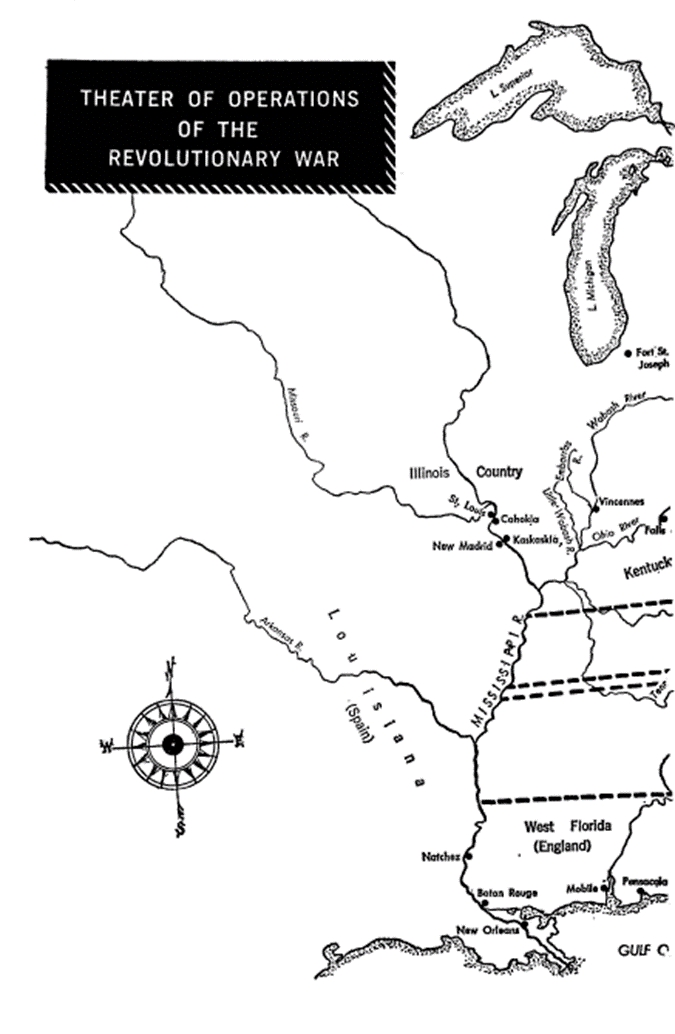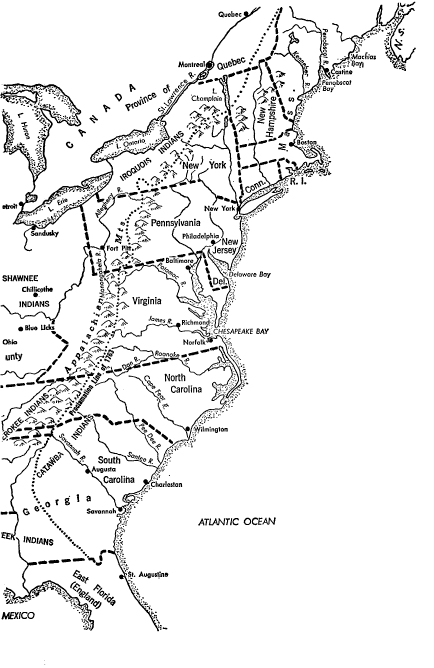THE COMPACT HISTORY OF THE REVOLUTIONARY WAR
R. Ernest Dupuy and Trevor N. Dupuy
R Ernest Dupuy, Trevor N. Dupuy 1963
R Ernest Dupuy and Trevor N. Dupuy have asserted their rights under the Copyright, Design and Patents Act, 1988, to be identified as the authors of this work.
First published in 1963 by Hawthorn Books, Inc.
This edition published in 2018 by Endeavour Media Ltd.
To Laura and Christine
Table of Contents
Reference Maps
Preface
THE BIRTH-PANGS OF OUR NATION deserve the serious scrutiny of all Americans. It is unfortunate that this proud and patriotic retrospection should be hindered today by the inadequacies of most of the existing general and standard historical works upon the American Revolutionary War. The deficiencies range from inaccuracy and incompleteness on the one hand, to imbalance and unsound analyses of the military operations on the other. The gamut runs from gross distortion of the Minuteman legend to derogation of the military qualities of the Father of his Country General George Washington. These faults are as prevalent in books concentrating on the military side of the Revolution as they are in more general works. Worse, this criticism applies almost as much to scholarly publications as it does to frankly popular books.
It has long been our feeling, therefore, that there is a crying need for an accurate, reliable history of the Revolutionary War, sufficiently short and entertaining to appeal to the general reader; yet so complete, reliable and analytical as to warrant the respect of both civilian and military scholars. This book is the result of our efforts to satisfy those requirements, within the natural limits of human frailty.
At the request of our publisher, we have not attempted to document our text with a formidable array of footnotes. We hope that most scholars will recognize that such notes tend to repel the general readers for whom this book is primarily intended. The absence of notes is at least partly offset, we believe, by a bibliography which includes only those primary and secondary works which we have actually consulted in the preparation of this book (save for some popular books omitted as not warranting such distinction). We also draw the attention of the scholar to our appendices which we trust will also interest some general readers who wish to delve more deeply into some of these topics.
American independence was achieved, of course, by force of arms. In portraying how this occurred, we have written a book that is essentially a military history. As military historians, however, we feel very strongly that military operations cannot be properly presented or understood save in a perspective which gives due prominence to all pertinent non-military factors and considerations.
Thus we have endeavored to show the political and economic causes of the Revolution, international as well as domestic. In particular we have endeavored to make clear that the American Revolution was only a part though the most important part of a world-wide conflict. We have felt it necessary not only to show the disappointments and hardships suffered by the American patriots, but also the handicaps and frustrations endured by the British, fighting a desperate defensive war around the globe, as well as the problems faced by our French allies in their gallant attempt to wrest command of the seas from Britain. We hope, too, that we have demonstrated that the Revolutionary War was won not by a united people, but by a belligerent minority of the inhabitants of the Thirteen Colonies, who overcame all obstacles to freedom only because they responded albeit sometimes reluctantly to the commanding genius of the one man who dominated the war from start to finish: George Washington.
We wish to acknowledge our great debt to three people: Laura Nevitt Dupuy, who painstakingly and carefully reviewed two manuscript drafts, and whose many major and minor suggestions have done so much to clarify the text, to prevent errors, and to assure completeness and balance; Jean Dengler Brennan, who patiently typed the drafts and the final manuscript, and who helped us to correct or to avoid the numerous minor inconsistencies which so stubbornly plague authors of a work such as this; Dyno Lowenstein, of Pictograph Corporation, who produced the excellent maps and diagrams which clarify the operations we have attempted to describe. If this book does, in fact, accomplish our objectives, these three must share in the achievement; if we have failed, it is despite their loyal, intensive and intelligent efforts to help us.
R. ERNEST Dupuy
TREVOR N. Dupuy
Arlington and McLean , Va .
Maps
Northern Theater of Operations of the Revolutionary War
Southern Department
Careering to Collision
IN 1764, ELEVEN YEARS BEFORE THE WAR of the American Revolution began. Englands king, statesmen and Parliament initiated the first of a series of blunders which progressively uprooted the loyalties of the Thirteen Colonies and stirred the ferment of armed rebellion in a fashion which could not have been bettered had it been carefully planned by some subversive Machiavelli.
For a good half-century and more in some instances the colonies had been blessed with local self-government. Although nominally dominated by governors appointed by the Crown, the machinery of self-government, supported by provincial taxes which paid the governors salaries as well, was carried on through provincial assembles and provincial courts.
Up to this time there had been no direct taxation by the Crown, though insofar as foreign intercourse was concerned, the Thirteen Colonies were indeed suffering from the Mercantile Theory of trade: colonies as mere instruments for increasing the wealth and power of European mother countries. So restrictions on colonial commerce were gaffing in legal theory at least. Actually, many of them were more honored in the breach than in the observance, for customs officers were few and usually complacent, while smugglers were legion.
One year earlier October 1763 the British government had, however, provided the colonists in general, and frontiersmen in particular, with a common grievance against Royal interference in their affairs. This was the Proclamation of 1763, which established the vast regions between the Appalachian Mountains and the Mississippi River as a widespread Indian reservation into which settlers were forbidden to move without specific Crown approval. This was intended to prevent renewal of the friction between white colonists and redmen which had been so costly in the recent Seven Years or French and Indian War. The proclamation was generally ineffectual, however, since it was ignored. Colonists continued to swarm westward over the mountains, while grumbling loudly at the law they were flouting.
Predominantly Anglo-Saxon in origin, the population of these colonies also contained other strains: Rhinelanders from the Palatinate, Germans, Hollanders, Swedes and French Huguenots. Most of these people had come over voluntarily, seeking a freedom they could not find in Europe. Others had been dumped involuntarily in America unfortunate law-breakers whose sin, for the most part, was that they had espoused the wrong cause in Englands stormy 17th century civil wars.














